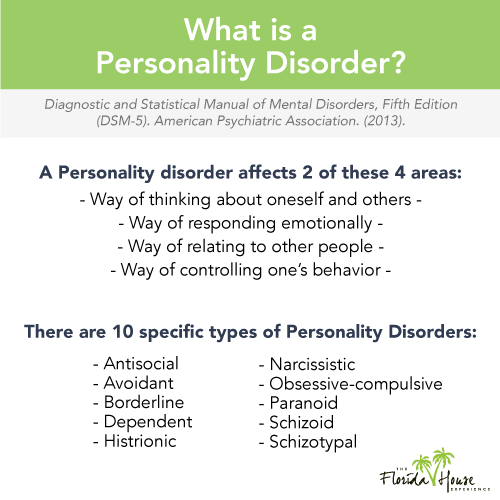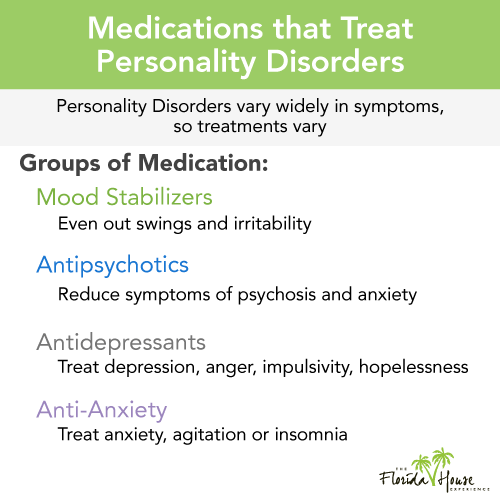Personality disorders occur in many people — you’re not alone. The National Institutes of Mental Health show that about 9.1 percent of adults have a personality disorder, and 1.4 percent have borderline personality disorder. It doesn’t matter what race or sex you are; it can occur in anyone. There are ways to get help if you believe you or your loved one has a personality disorder.
FHE Health offers integrated medical care that includes mental health disorder treatment, including personality disorder treatment, in a safe, protected environment. Our comprehensive services can help you or a loved one become stable and safe while working to provide as much support as possible.
Need Help?
Treatment can begin quickly and discretely, get started now
What Are Personality Disorders?
Your personality, which develops during your childhood, is what makes you who you are. It’s how you see and relate to the world and the people in it. You inherit certain traits of your personality from your parents. Where you grew up, events in your life and your relationships with family and friends are all part of your personality. Both your genes and the environment contribute to your personality.
While causes of personality disorders (PD) can be hereditary, they may also develop because of a dysfunctional family. Events in your life can also trigger PD, such as living in a traumatic environment, living in a home with an alcoholic member or being the victim of sexual or physical abuse. If someone else lives in your home who has a PD, this may mean you’ve been exposed to traumatic events yourself.

PD can interfere with all aspects of your life. It can make maintaining a relationship difficult or make it hard to complete work tasks or school assignments. In many situations, it creates social isolation, which may lead to the development of alcohol or drug abuse.
What are the Types of Personality Disorders?
 There are 10 different types of personality disorders. The type of personality disorder you have is diagnosed by your therapist after comprehensive testing and evaluations. It’s important to know this simply because it helps your doctor and counselor develop a treatment plan for you.
There are 10 different types of personality disorders. The type of personality disorder you have is diagnosed by your therapist after comprehensive testing and evaluations. It’s important to know this simply because it helps your doctor and counselor develop a treatment plan for you.
PDs are grouped into three categories:
Cluster A Disorders
Cluster A disorders are noted by their eccentric behavior. To anyone else, the behavior seems odd and even bizarre. They include:
- Paranoid behavior — A distrust of family, friends, and spouse/partner
- Schizoid — Directs attention toward their own inner life, away from the external world, almost like a fantasy life
- Schizotypal — Displays odd appearance, behavior and speech; fears social interaction; thinks others are harmful
Cluster B Disorders
This classification of personality disorder is often defined by erratic behavior. Some may say your behavior is dramatic or over-the-top. These personality disorders can be powerful but tend to be more pronounced than others. They include:
- Antisocial — More common in men than in women; callous regarding feelings of others; no regard for social rules; can be irritable and aggressive, impulsive
- Borderline — Lacks a sense of self; feels empty or abandoned; instability in relationships; experiences outbursts of anger and violence
- Histrionic — Loves to attract attention, like they are “acting out a part”; takes great care of their appearance; craves excitement
- Narcissistic — Has an extreme feeling of self-importance and entitlement; needs to be admired and envied; readily lies and exploits others to get what they want; controlling
Cluster C Disorders
This classification is much the opposite. Here, individuals tend to show fearful behavior and are anxious and often worried. Disorders include:
- Avoidant — Feel socially unaccepted or inferior; always a fear of being embarrassed, criticized or rejected
- Dependent — Lack of self-confidence; inadequate; needs to be taken care of by someone
- Obsessive-compulsive — Excessive when it comes to details and organization; perfectionist almost to a fault
Signs and Symptoms of Personality Disorders
It’s difficult to tell the difference between someone having a strong personality or a unique view on life and having a debilitating PD. In many situations, it’s important to look at the way a person acts and feels in context to the way it impacts their daily life. Here’s a breakdown of what you or your loved one may experience.
Cluster A Disorders Signs and Symptoms
Individuals in this group tend to show signs such as the following, which could indicate a need for personality disorder treatment.
- Distrusting everyone and being suspicious of the motives of everyone around them
- Looking at an innocent comment or nonthreatening situation as a personal attack
- Lacking any interest in social or personal relationships; preferring to remain alone all the time
- Seeming mean or just indifferent to others
- Having no interest in sex or in engaging in personal relationships
Those who have schizoid or schizotypal disorders typically have a bit of a different experience. In schizoid personality disorder, you may notice:
- Limited range of emotional expression; just doesn’t seem to care about anything
- Lacking any type of personal relationship and having no interest in doing so
- Having trouble picking up on social cues, often saying the wrong thing
- Lacking emotional expression in most forms
Those who have schizotypal personality disorder may also show signs like the following:
- Having odd perceptual experiences such as whispering names
- Dress or speaking in a unique way — often very out of the ordinary
- Having “magical thinking” in which they believe thoughts can change the events or outcomes of people
- Having a strong amount of social anxiety or discomfort in close relationships
Cluster B Disorder Signs and Symptoms
In Cluster B disorders, a different set of signs and symptoms is common. They can include any of the following:
- Repeatedly violating the rights of other people
- Exhibiting a heightened level of impulsive behavior
- Consistently being irresponsible
- Lying or cheating
- Often showing a lack of remorse for their behavior
In those with histrionic Cluster B, the symptoms of this condition may include:
- Having a strong demand and need for attention
- Tending to be easily influenced by other people
- Believing relationships with others are closer than they actually are
By comparison, those with a narcissistic personality disorder display signs such as:
- Believing they are special or even more important than others in the room
- Arrogance, with or without any actual foundation for it
- Failing to recognize the needs of other people
- Thinking about success, how attractive they are or power
Cluster C Disorders
Signs of Cluster C disorders may include the following:
- Being too sensitive to rejection
- Social inhibition, or being very shy
- Fear of being embarrassed
- Excessive dependence on others
- Urgent need to start a new relationship if one ends
For those with obsessive-compulsive disorder, there is a strong preoccupation with the orderliness or details of things in the home and in life. They strive to control everything through extreme perfectionism.
More Questions about Treatment?
We offer 100% confidential and individualized treatment
What Treatment Is Available for Personality Disorders?
 Anyone suffering from a personality disorder can benefit from treatment. Though it may be difficult for loved ones to convince them to take action, treatment for a personality disorder may improve the life of that person as well as their family. At FHE Health, we offer a comprehensive program to treat a patient’s unique needs. The classification of the disorder, along with its severity, plays a role in determining proper treatment.
Anyone suffering from a personality disorder can benefit from treatment. Though it may be difficult for loved ones to convince them to take action, treatment for a personality disorder may improve the life of that person as well as their family. At FHE Health, we offer a comprehensive program to treat a patient’s unique needs. The classification of the disorder, along with its severity, plays a role in determining proper treatment.
A mental health professional learns as much as they can about the condition and any foundation for it, such as a traumatic event that may have occurred. Then, during therapy sessions, the focus is on the feelings, thoughts, and moods you have. Behaviors are discussed, including why they happen. From here, the goal is to provide methods to manage the disorder and the stresses it causes in day-to-day life.
This type of treatment for personality disorders can occur in individual sessions as well as group therapy. A variety of styles are available to meet the individual needs of the patient. Many people will also receive social skills training, a key area of focus in the success of this condition.
Other personality disorder treatments available at FHE Health include deep brain stimulation therapy, computerized cognitive brain training and electrical nerve stimulation therapy, among others.
Living with a Personality Disorder — Long-Term Recovery
In the long term, proper care and ongoing therapy can help those with PD to see significant improvement in their day-to-day life, happiness, and relationships. Like many other medical conditions, PD needs to be managed over time using ongoing therapy. Medication may be necessary in some cases.
Perhaps most important is the adoption of coping and supportive tools. Those who have a PD need a strong support system. They also can improve their long-term outcome by receiving treatment for any type of drug or alcohol abuse, if they’ve used these substances to cope with their condition.
At FHE Health, you can expect comprehensive help in this manner. If you or a loved one may have a PD, contact us for immediate help.
Begin Your Recovery Today
Begin your recovery today
Ready to start? More questions about treatment?








